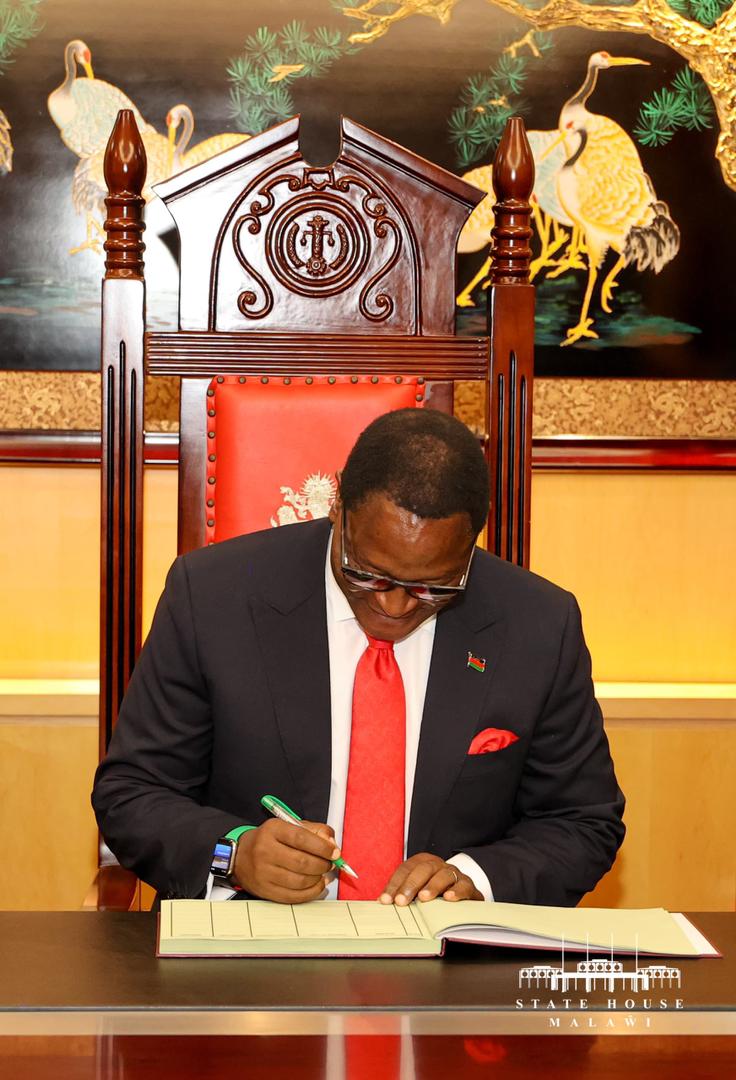By Burnett Munthali
In recent years, Malawi has been embroiled in political promises and public frustrations, particularly surrounding the government’s ambitious economic and employment initiatives. One of the most notable promises was President Lazarus Chakwera’s pledge to create one million jobs. However, the harsh reality that has unfolded seems more like a dystopian turn as the country now finds itself contending with violent protests, widespread unrest, and the alarming proliferation of machete (panga) knives. This transformation from “one million jobs” to “one million panga knives” is not just a failure in economic policy, but a symptom of a broader political and governance crisis that is eroding the country’s social fabric.
The promise: One million jobs
When President Chakwera came into power in 2020, his administration, through the Malawi Congress Party (MCP), campaigned on promises of job creation, economic growth, and poverty alleviation. One of the most ambitious aspects of his campaign was the promise to create one million jobs, a key pillar in his vision for a better future for Malawians, especially the youth.
The concept of creating one million jobs was both a vote-winning promise and a reflection of the country’s deep-rooted unemployment challenges. Malawi’s youth unemployment rate had reached concerning levels, with many young people resorting to informal, underpaid, and often unsafe work in the hope of survival. As the country’s population continues to grow, particularly in urban centers like Lilongwe and Blantyre, the demand for stable, well-paying jobs has become a key political issue.
Chakwera’s promise was well-intentioned, but the path to its realization has been filled with obstacles—policy missteps, lack of clear implementation strategies, and global economic factors such as the COVID-19 pandemic, inflation, and global supply chain disruptions. While some job creation efforts were made, such as in agriculture, tourism, and education, they have not been nearly enough to satisfy the growing demand for employment.
The reality: Panga knives and machete violence
Fast forward to 2024, and the story of “one million jobs” has taken a grim turn. Rather than finding themselves with stable employment, large swathes of the population—especially the youth—are resorting to violence and vandalism as a form of expression. This shift has been starkly represented in the rise of machete-wielding gangs who are increasingly using these weapons as tools of political protest and violence.
Machetes (locally known as “pangas”) have become symbolic of frustration and anger at the government’s failure to deliver on its promises. This phenomenon was witnessed dramatically in November 2024, when a group of angry young men in Lilongwe chased technicians hired to erect a billboard of President Chakwera, hurling insults and violently defacing the image of the President. The use of panga knives in this incident, accompanied by the harsh and incendiary rhetoric, highlights a dangerous shift in the country’s political climate. The youth, particularly those between the ages of 18-35, who were promised jobs but instead face unemployment and economic instability, have found an outlet for their anger in physical violence.
This new wave of violence is not isolated. It mirrors the broader trend of growing political tension in Malawi, especially as the country moves closer to the 2025 elections. The prevalence of machetes and other weapons in political protests and rallies is a disturbing signal that political discourse is becoming increasingly violent. The machete, once a tool for everyday life in rural areas, has now been weaponized in the political sphere, symbolizing the anger of a disillusioned electorate.
The underlying causes: A complex web of factors
The journey from “one million jobs” to “one million panga knives” is not a simple narrative of broken promises. It is a consequence of multiple systemic issues within Malawi’s political, social, and economic structures.
One of the key reasons for this violent turn is the economic mismanagement that continues to plague the country. High inflation, a struggling agricultural sector, and the ongoing issues of poverty and inequality have left many Malawians feeling as though their leaders have abandoned them. The lack of meaningful job creation, coupled with the failure to implement economic policies that address the real needs of the people, has left many young people frustrated and desperate.
Politics in Malawi has become increasingly polarized, with parties and their supporters resorting to violence to express dissent. The use of machetes as a form of protest or intimidation has become a symbol of this deepening divide. Both the ruling and opposition parties have witnessed instances where violence has escalated into broader social unrest. This culture of impunity is exacerbated by the failure of law enforcement to take decisive action against such groups, leading to an atmosphere of fear and lawlessness.
The youth demographic, which makes up a significant portion of Malawi’s population, has been at the forefront of this violent transformation. With limited employment opportunities, rising costs of living, and a lack of political representation that addresses their concerns, many young people have lost faith in the traditional political systems. In a society where the promise of jobs and better living standards has been left unfulfilled, the frustration among the youth has boiled over into violence.
The use of panga knives and machetes in political discourse is not just a problem of law and order—it is a sign of the erosion of democratic norms. Political violence undermines the core principles of democracy, where peaceful protest and constructive dialogue should be the means by which citizens express their dissent. The normalization of violence as a political tool threatens to derail the country’s democratic progress, particularly as Malawi heads into an election year.
If this trend continues, Malawi risks falling into a vicious cycle of violence, political instability, and economic stagnation. The country, which has worked hard to establish itself as a democratic nation in the southern African region, may find itself slipping into the kind of lawlessness and political violence that has marred other African nations.
For Malawi to avoid descending further into chaos, urgent reforms are needed in both governance and political culture. The government must take responsibility for the unmet promises of job creation and work to implement real, sustainable economic policies that address the needs of the people. Additionally, law enforcement must be empowered to tackle political violence and ensure that the use of machetes as political tools is swiftly curtailed.
Furthermore, there must be a concerted effort to engage the youth, restore their trust in the political process, and offer them tangible opportunities for employment and self-development. This may require not only jobs but also investments in education, entrepreneurship, and skill development to provide young people with the tools they need to thrive.
Conclusion
In conclusion, Malawi stands at a crossroads. The shift from “one million jobs” to “one million panga knives” is a stark reminder of the consequences of failed promises, poor governance, and political violence. The country must confront these challenges head-on, with strong leadership, accountability, and a renewed commitment to the welfare of its citizens. If Malawi is to avoid becoming mired in the cycle of violence and disillusionment, its leaders must take decisive action to address both the symptoms and the root causes of unrest.
The future of Malawi depends on whether its leaders can move beyond empty promises and deliver real solutions that restore hope, stability, and peace to the country.




